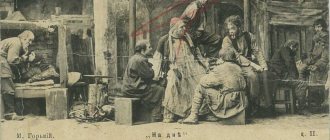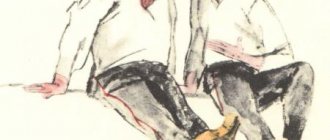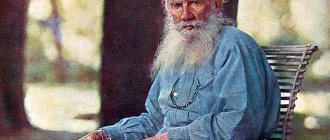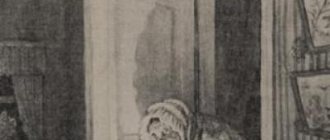- Essays
- Literature
- Bitter
/
/
The actor is not the main character of Gorky's play "At the Lower Depths". He has taken part in stage productions in the past. Since then, a lot of water has flown under the bridge, and the actor found himself at the bottom of his life in a shelter. The reason for this was alcohol. During his acting days, he had an excellent memory and did not forget any of his roles. A riotous lifestyle and constant consumption of alcohol led to the fact that he could not reproduce in his memory either his heroes or even his own name. All that he managed to remember from his past was only his pseudonym, Sverchkov-Zavolzhsky. Having sunk so low, he begins to regret the times when he enjoyed recognition, fame and success. He hopes he can get that life back.
Now our hero lives in a shelter, having lost his job, and constantly drinks with an equally degraded person from the same shelter. Having gotten drunk, he begins to tell everyone how well he once lived and what roles he played. One fine day, the wanderer Luka accidentally ends up in the shelter. He consoles and takes pity on all the inhabitants of the shelter. When he becomes aware of the Actor's vice, he reports that a hospital for people suffering from alcoholism has been opened in one city. Luka speaks about this so convincingly and eloquently that the Actor awakens faith in a possible full recovery. The hope of returning to the stage arises in him, he begins to dream and make plans. His faith grows so strong that, having given up alcohol, he begins to earn and save money for a trip to this hospital.
One day, the Actor discovers that Luka has disappeared as unexpectedly as he appeared. This act is not understandable for the hero. The awakened soul of the Actor undergoes a breakdown. Because Luke leaves, hope dies. The actor is in a confused and desperate state. The end of dreams and faith in people has come. Now that the meaning of life has been lost, there is only one thing left - suicide. He leaves the shelter in an unknown direction, and after a while it is discovered that he hanged himself. You can’t give a person hope and then take it away.
For the Actor, it was not at all news that a person finds himself at the bottom of his life when he stops believing in himself and his capabilities. You can rise after a fall only by feeling support and showing perseverance and fortitude. And so, when our hero begins to feel support from the outside, when his spirit begins to be reborn for the fight, he, like a fragile sprout, is cut off at the root. He finds no other way out than death.
Life in a flophouse
The actor is about 40 years old. His name is never mentioned in the play. Only once, after Luka’s appearance, does he remember his stage name. Like the Baron, finding himself “at the bottom,” the former artist loses everything: calling, position, home, loved ones, himself and his name. The hero drinks a lot. Drinking has greatly affected his health, which he periodically reports with some naive pride. One gets the feeling that the character is theatrically exaggeratedly proud of the extent of his fall. The lodgers, however, do not have any respect for him. Before the Actor, having woken up in the morning, has time to enter into a general conversation, Satin calls him a blockhead, others demand that he tidy up the common room, although it is not his turn. Complaints about poor health (“it’s harmful to breathe dust,” “my body is poisoned by alcohol”) do not evoke sympathy.
The drunken artist has been living in the basement for a long time, everyone has managed to get to know him well, and he is of little interest to the residents of the shelter. No one notices if the Actor, in the middle of a conversation, suddenly falls silent, lost in thought. No one listens when he recalls episodes from his theatrical past. It’s as if he’s having a dialogue with himself. His remarks before Luke's appearance are incoherent and fragmentary, often representing hackneyed quotes from classical plays (“Ophelia! Oh... remember me in your prayers!..”). It is impossible not to notice that the Actor is a kind person. It is he who takes the sick Anna to the entryway, where there is fresh air and not so noisy, makes her more comfortable, wraps her up warmer.
Characteristics of the Actor
The play “At the Lower Depths” is one of the most famous works of Maxim Gorky. It describes the life of people in a Moscow night shelter. Initially, according to the author's plans, the play was supposed to be included in a cycle of 4 works reflecting the life and worldviews of people from different walks of life. In the play “At the Bottom,” Gorky raises a philosophical question: can a person preserve himself and his personality while being at the moral and social “bottom” of public life?
One of the minor characters of the play is the Actor. The man is about 40 years old at the time of the story. He lives in a shelter for the poor, which is maintained by Kostylev. In the past, the Actor worked in the theater and played in plays. His stage name is Sverchkov-Zavolzhsky. Now the Actor does not work anywhere, drinking all day long. He considers himself a lost man, recognizing the fact that alcohol ruined his life. He owes Kostylev money for staying in the shelter. The hero cannot be called a callous person. He helps sick Anna out of the room when she feels stuffy. The Actor has such character traits as empathy and compassion.
The arrival of old man Luka at the shelter gives the Actor hope. Luke talks about a city that has a free hospital where they treat alcoholism. The old man does not give the name of the city, citing the fact that he has forgotten it. Most likely, Luka is deliberately lying about the city he invented in order to cheer up the Actor. However, the old man assures that he will definitely remember the name, but for now the Actor needs to not drink for a while. The hero begins to live with hope for the new life he will begin. Now he has a dream, and therefore a meaning in life: he wants to get rid of alcoholism, start working, leave the bottom of the social pit. To get to the hospital, the hero begins to save money.
The Actor's friend Satin assures his friend that Luka is lying, but in fact there is no city with a free hospital. Satin's views in the play are contrasted with Luke's worldview. The old wanderer loves people, he tries to instill in them hope for a happy future. Out of compassion for the person, Luka resorts to a saving lie, which allows the Actor to believe in himself and in his strength. The gambler and sharper Satin is against deception; he believes that people must face the inevitable truth; only in this way, according to the hero, can one speak about the greatness of a person, about the strength of his spirit.
After Luka’s sudden disappearance from the shelter, Satin finally convinces his comrade of the fictionality of the free hospital and the wonderful city, the name of which the old man never told the Actor. The hero begins to drink again, and at the end of the work the Baron finds him committing suicide.
Other topics: ← Nastya in the work At the bottom↑ GorkyBubnov in the work At the bottom →
`
Actor and Luka
It is not surprising that such a pitiful, weak man attracted the attention of Luke and himself reached out to the wandering seeker of faith. An actor needs support, someone's active participation is necessary. Next to Luka, the hero transforms, as if blossoming. He almost stops complaining. The benevolent Luka evokes sincere sympathy in the Actor, a desire to please the wanderer with something. “Come on, old man... I’ll recite the verses for you...” he suddenly offers. This is how Bérenger’s poem appears in the drama.
Beranger's poems are one of the ideological ones that know how to give humanity a “golden dream” - without a doubt, a metaphorical portrait of the comforter Luke. Friendliness, respect, ease of communication force the drunkard who has fallen below any limit to remember that inspiring lines about the greatness of Man live in his memory, and he once loved them. A respectful attitude and kindness are enough for the Actor to feel like an individual and feel in his soul a spark of talent that seems to have fallen asleep forever. It should be noted that the elderly wanderer does not flatter the drunken artist at all, does not downplay his problems, because forgetting the most dear, beloved is very bad, “the whole soul is in the beloved...”
Pros and cons of the profession
| Positive aspects of the profession: + Interesting creative work + Popularity and love of the audience + Opportunity to travel + Creative environment + And even the opportunity to make history one day | But there are also negative aspects to being an actor: — Irregular work schedule |
Hope and parable about the righteous land
The hero clings to the opportunity to regain his former self, regain his soul, and hear thunderous applause again. The old man gives him hope for this, promising to name the city where there is a hospital that cures alcoholism. It was this promise, as well as the advice to Ash to go to Siberia, that the stern Kleshch described as a consolation for Nastya: “He beckoned them somewhere... but he didn’t tell them the way...” In fact, the Actor had already taken the path that could lead it from its current state. In preparation for treatment, he stops drinking and goes to sweep the streets to earn money for a trip to another city. Having acquired the habit of a sober and active lifestyle, he would eventually be able to do without the help of doctors. Luka told him about the hospital because the Actor would not have believed that he could cope on his own. He needed hope for a miracle from the outside.
The character's story largely coincides with the parable about a man looking for a righteous land. The hero of the parable falls victim to the same mistake that the Actor made. He was looking for a land where people are just and merciful, instead of trying to build life on such moral foundations now. The actor hoped for a hospital where he would be given back himself, his talent, his calling, when he could have done it himself.
What skills should a future actor have before starting training?
This list will be useful to study for applicants to theater universities and theater studio schools, since the qualities indicated in it largely determine the chances of passing the selection. Despite a common misconception, the selection committee for entrance exams hardly looks at the professional skills of the applicant. In the end, the applicant did not come to the casting, not to get a job, but to learn the skill of an actor, and it would be strange if he already possessed it. But how promising an applicant is, what chances he has of becoming a sought-after artist after training, the commission will try to determine based on his natural data and inclinations.
In world theater and cinematography, there are many cases where an unremarkable student became the brightest star of his time. Therefore, you should not give up if you do not meet any of the criteria below.
Here is a short list of qualities that a candidate for an acting future must have:
#1 External data, invoice.
Expressive appearance is a given by nature, which an actor must possess. No make-up artist or costume designer can replace it with anything, nor can it spoil it.
#2 Voice data and speech without defects.
The strength of the voice and the breadth of its range can be developed in vocal and speech classes, but nothing can be done about the timbre. The timbre of a voice is as unique as the retina of an eye or a fingerprint. If your voice, based on its timbre characteristics, can be defined as unpleasant or disgusting, then at best, specific characteristic roles await you.
#3 Sense of rhythm.
This quality can be developed, but only if it is present in the form of a minimum deposit. 100% arrhythmic people are very rare, but they do exist. Unfortunately, the way to the stage for such people is closed.
#4 Ear for music.
As with the sense of rhythm, there is a very small percentage of people who have no ear for music at all and are unable to develop it.
#5 Satisfactory physical shape and flexibility.
An actor does not have to be an athlete, but he should be prepared for physical activity. Training involves classes in acrobatics, choreography and specific types of stage movement (for example, staged fights). Physical endurance and plasticity can be developed during the learning process, but it will be easier for the student who already has primary training in this direction.
Conclusion
The image of the Actor is necessary in M. Gorky’s play “At the Bottom” as proof that the “golden dream” inspired by noble madmen is destructive for weak souls. He deprives them of faith in their own strength, in the omnipotence of Man, in which Satin is so confident. The question of truth, lies, hope for the future, self-confidence, found a terrible practical solution in the fate of a bitter drunkard. The actor put an end to the discussion that the drama's characters are engaged in.
Characterizing the image of an Actor can be useful when writing essays and for preparing literature lessons.
What qualities should one have (personal qualities)
Actor
is a profession more suitable for extroverts.
The actor feels the attention of fans not only on stage, but also in his personal life. If you are not ready to interact with a large number of people on the set and constantly communicate with journalists, then working as an actor can be difficult psychologically. In addition to ✎
the ability to easily get along with people and
✎
creative abilities,
an actor needs
:
✎
The ability to speak in public (not have stage fright)
✎
The ability to work in a team
✎
Excellent memory
✎
✎
speaking
✎
Endurance and physical fitness ✎
Abstract thinking
✎
Self-confidence strength
✎
Energy
Famous representatives of the profession
Sergey Vitalievich Bezrukov
Soviet and Russian drama theater and film actor
Soviet and Russian dramatic theater and film actor, theater director, producer, screenwriter, People's Artist of the Russian Federation (2008)
More details
Nikulin Yuri Vladimirovich
Actor, circus performer
Soviet Russian circus performer, circus director, film actor, TV presenter, People's Artist of the USSR (1973), Hero of Socialist Labor (1990)
More details
Salary and career
In Russia, an artist’s earnings can range from 500 to 450,000 rubles for one shooting day. The first figure is typical for extras, and the last figure for actors who have achieved star status. The level of earnings of a professional representative is influenced by his demand, experience, awards or titles. Theater employees receive the salary specified in the employment contract, which consists of a base salary and various types of allowances.
The career of most artists begins with passing roles in films and television films, theatrical productions, and TV series. As they gain experience, they become more recognizable to the audience and make connections in the acting community, which gives them access to more promising projects. Some Russian artists try their hand abroad.







